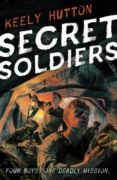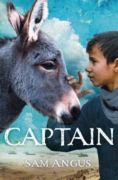A recognition of Muslim loyalty and sacrifice during WW1 portrayed through a letter between a Muslim grandchild to his/her war hero great-grandpa to reassure him that his story and bravery will never be forgotten.
World War I
War Is Over
It’s 1918, and war is everywhere. John’s father is fighting in the trenches far away in France, while his mother works in a menacing munitions factory just along the road. His teacher says that John is fighting, too, that he is at war with enemy children in Germany. One day, in the wild woods outside town, John has an impossible moment: a dreamlike meeting with a German boy named Jan. John catches a glimpse of a better world, in which children like Jan and himself can one day scatter the seeds of peace. David Almond brings his ineffable sensibility to a poignant tale of the effects of war on children, interwoven with David Litchfield’s gorgeous black-and-white illustrations.
The Button War

Patryk and Jurek are as much friends as rivals in the small Russian-occupied Polish village where they live. When, in August 1914, Patryk finds an old button on the forest floor, Jurek becomes wildly jealous. Not long after, World War I comes to Poland, bringing one invading army after another to the village. Jurek devises an exciting dare among the seven boys in their pack: whoever steals the best military button will be Button King. The boys agree. The contest is on. The competition escalates from stealing uniform buttons on a wash line to looting the bodies of dead soldiers to setting up an ambush. Leading the charge is Jurek, who will do anything to be Button King. It’s only Patryk who tries to stop Jurek’s increasingly dangerous game before it leads to deadly consequences.
The Skylarks’ War

In early twentieth-century England, Clarry Penrose longs for an education and life of her own, but it is not until her beloved cousin, Rupert, is declared missing during World War I that she can take her chance.
The Grand Escape

At the height of World War I, as battles raged in the trenches and in the air, another struggle for survival was being waged in the most notorious POW camp in all of Germany: Holzminden. A land-locked Alcatraz of sorts, it was home to the most troublesome Allied prisoners–and the most talented at escape. The Grand Escape tells the remarkable tale of a band of pilots who pulled off an ingenious plan and made it out of enemy territory in the biggest breakout of WWI, inspiring their countrymen in the darkest hours of the war.
Secret Soldiers

In 1917, Thomas, a thirteen-year-old coal miner seeking his missing brother, James, joins the Claykickers, who tunnel beneath the battlefields of the Western Front as they learn to be men.
Innocent Heroes

This book consists of eight connected fictional stories about a Canadian platoon in WW1. The Storming Normans have help from some very memorable animals: we meet a dog who warns soldiers in the trench of a gas attack, a donkey whose stubbornness saves the day, a cat who saves soldiers from rat bites, and many more. Each story is followed by nonfiction sections that tell the true story of these animals from around the world and of the Canadian soldiers who took Vimy Ridge. Through the friendship that grows between three of these soldiers in particular, we get a close-up look at life in the trenches, the taking of Vimy Ridge, the bonds between soldiers and their animals and what it meant to be Canadian in WW I.
Captain

It’s 1915 and British troops are about to sail to Gallipoli. Billy is the youngest soldier in his platoon and is teased for not being old enough to drink or shave. The truth is, at fifteen he’s not old enough to be a soldier, either, and he’s terrified of the war he’s about to fight. Then he meets Captain, a refugee boy, and his donkey, Hey-ho. Together they teach Billy what it means to be brave, loyal, and fearless, and above all what it means to be a friend. Sam Angus pulls at heartstrings in this stirring wartime friendship story.
A Soldier’s Sketchbook

Russell Rabjohn was just eighteen years old when he joined up to fight in the First World War. In his three years of soldiering, he experienced the highs and lows of army life, from a carefree leave in Paris to the anguish of seeing friends die around him. Like many soldiers, he defied army regulations and recorded everything he saw and felt in a small pocket diary.
Listen To The Moon

lfie lives off the coast of England. Merry lives in New York City. Until Merry and her mother set sail on the Lusitania for England, where Merry’s father is recuperating from a war injury. People told them not to go, hearing rumors that the Lusitania might be carrying munitions. But they are desperate to be reunited with Merry’s father. Alfie and his father find a lost girl in an abandoned house on a small island. The girl doesn’t speak, except to say what sounds like “Lucy.” Alfie’s mother nurses her back to health. The others in the village suspect the unthinkable: Lucy is actually German―an enemy―because she’s found with a blanket with a German tag.
